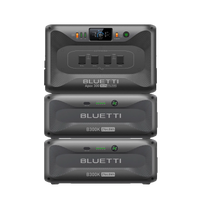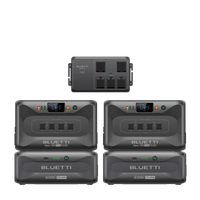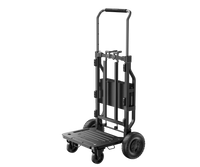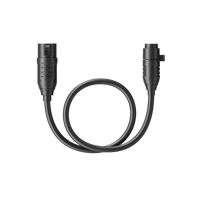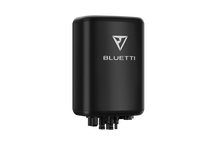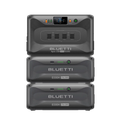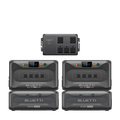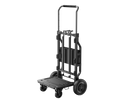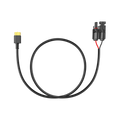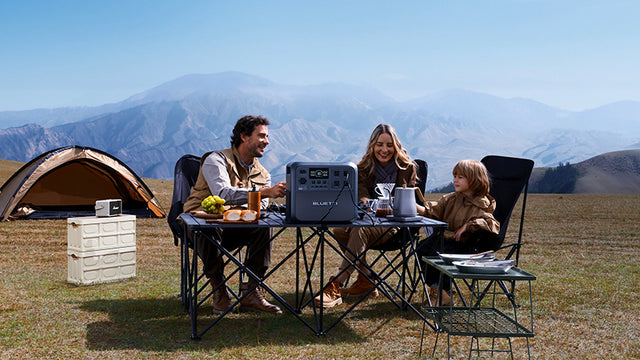Your cart is empty
Shop our productsInstalling solar panels has become an easy and efficient exercise. With support from the federal government, states, and manufacturers, homeowners can transition to green energy seamlessly. But how do you choose the ideal solar panel for your home? Let’s find out.
How Do Solar Panels Work?
Solar panels convert sunlight into electricity using photovoltaic cells. The cells absorb the solar radiation produced by sunlight. Once the electrons in the cells are energized, they form an electric current which is channeled to your electric circuit or solar batteries.
The cells are made of silicon, which enables conversion of sunlight into electric energy. A solar panel will also have a frame, backsheet, and encapsulation that hold the cells together. The junction box holds wires and other crucial electrical components. Finally, there’s the connectors used to connect the solar panels to the solar systems. These are mostly MC4 connectors.
Most solar panels will require an inverter to convert direct current into alternating current. The direct current that the solar panels produce cannot be used to power household devices. Most household devices use alternating current. The inverter will transform the direct current into alternating current from the solar panels and solar batteries to be used by your devices.
Other crucial components commonly installed with solar panels include solar batteries, a telemetry hub, microinverters, and a rapid shutdown device.
Benefits of Solar Panels

Solar panels have many benefits including:
Low Maintenance
Unlike other sources of electricity, solar panels require little to no maintenance. Once installed, you just need to clean them at least twice a year. And this should be done by professionals to avoid damaging the solar cells. Another component that needs maintenance and replacement is the inverter. Ideally, you should replace it once every 10 years.
Clean Energy
Other sources of energy such as coal produce greenhouse gasses that pollute the environment. Solar panels on the other hand don’t produce emissions when converting sunlight to electricity. Furthermore, solar panels allow you to use renewable energy. Solar energy is always available and we can’t deplete it.
Increases Home Value
Another reason to install solar panels is their impact on your home’s value. This is however beneficial if you want to sell your home after the payback period. Homes with solar systems tend to attract more buyers and sell faster than conventional ones.
Energy independence
Some areas have unreliable power grids or are prone to constant power outages. Installing solar panels with solar batteries can reduce your reliance on the grid. Besides, some states have net metering, allowing you to sell the excess electricity.
Versatile
Not all solar panels are intended for rooftop installation. There are many portable options like BLUETTI solar panels. Armed with it and a portable power station, you can use it for different purposes. For example, you can use it to power your campsite, charge small devices at home, or use it for simple outdoor activities.
How Do I Choose the Right Solar Panel?
Panel Type
There are two types of panels: monocrystalline and polycrystalline.
Monocrystalline solar panels are the most efficient of the two. They are darker and made of pure silicon. Since they are more efficient, they produce more energy than polycrystalline options. They are however the most expensive of the two.
Polycrystalline panels are made of several silicon particles per cell. This makes them less efficient than monocrystalline. They are also lighter, mimicking a light blue color. You’d need more polycrystalline panels to produce the same amount of electricity. Fortunately, they are cheaper than monocrystalline options.
Color of The Panel
If you want to improve the aesthetics of your home, then you’ll need to consider the panel color. Here, you’ll choose your preferred backsheet and frame. Solar cells are placed on the backsheet, which comes in two options: white and black.
Most solar panels companies will offer their solar panels with black backsheets. They are more appealing as the panel cells look more uniform. That said, they are prone to overheating, especially in hot areas.
Frames come in two options: black and silver. As you’d expect, black frames are more appealing. But both will perform similarly.
Solar Panel Size
There are two panel sizes: 60 and 72-cell. A 60-cell solar panel has 60 cells while a 72-cell panel has 72 cells. The latter are at least one foot taller. The 72-cell panels are suited for large spaces such as commercial rooftops while 60-cell panels are suited for residential rooftops. However, you can install a 72-cell panel on your rooftop. Besides, it produces more electrical energy.
Output Rating
Another aspect to consider is the power output. Power output is how many watts a solar panel can produce. Ideally, most solar panels will have a 200 watts to 420 watts rating. The higher the wattage, the more electricity the solar panel will produce.
Solar panels with a higher wattage rating fetch a higher price. While wattage should be a determinate on which solar panel you should buy, you should also consider its efficiency. If possible, go for a solar panel with a high efficiency. BLUETTI solar panels have some of the highest efficiency capped at 23.4%.
How Much Power Do Solar Panels Produce?
To determine how much power solar panels can produce, you simply multiply the size by peak sun hours. Here, you’ll need to determine the wattage rating of the solar panels. Most solar panels range from 200 watts to 400 watts.
Next, consider the peak sun hours of your location. There are several online websites that display different areas peak sun hours. Now, to determine how much power the solar panels will produce, multiply the wattage by the total peak sun hours. This will give an estimation when all conditions remain constant.
You should however note that daily energy output varies due to the weather, latitude, shading, and temperature.
Do You Need Solar Batteries?
Solar batteries allow you to store excess energy produced by the solar panels. Unfortunately, they are expensive and are not always compatible with existing solar systems. So, while they are good to have, they are not a necessity.
Solar batteries are an ideal investment if you live off the grid. They allow you to use solar energy throughout the year. And if your area is prone to power outages, installing solar batteries is a viable option.
Solar batteries are an excellent backup power solution that can reduce your reliance on the power grid. You should consult a professional installer to determine whether incorporating solar batteries is economical.
3 Best BLUETTI Solar Panels
Here are three solar panels you can buy from BLUETTI today
BLUETTI PV420 Solar Panel | 420W

This portable yet efficient solar panel has a 23.4% conversion rate which is higher than most solar panels. With it, you can rest assured that you’ll utilize most of the peak sun hours in your area. And since it is a 420W panel, it will generate more electricity for storage and immediate use.
Like most BLUETTI solar panels, it is easy to set up and use. Just place it under direct sunlight and you are good to go. And thanks to the built-in kickstands, it can withstand environmental elements. It is foldable and portable, meaning you can place it at different locations.
BLUETTI PV350 Solar Panel | 350W
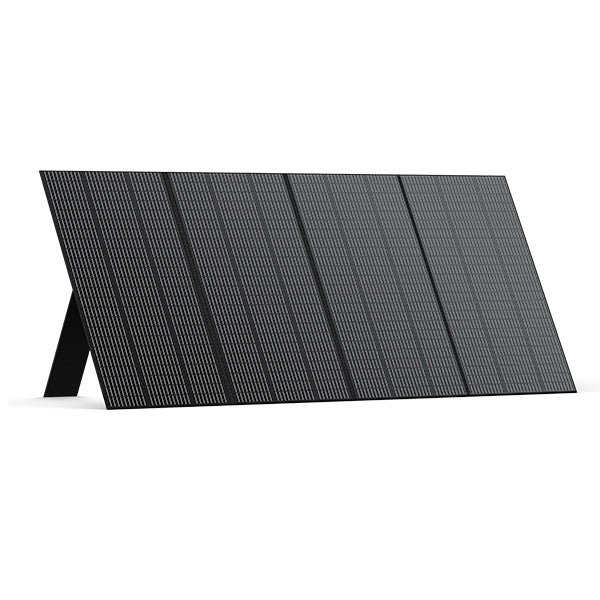
This is another solar panel you can buy for your home use. With a 350W rating, it produces ample power to run small and medium appliances such as laptops. It also comes with a high 23.4% conversion rate. There’s a kickstand to aid in its stability. You don’t have to worry about wind gusts.
The model is splash-proof allowing you to use it even when it is raining. And as a durable unit, you can use it for at least 10 years. As you’d expect, it is foldable and portable so you can transport it to different areas.
BLUETTI PV200 Solar Panel | 200W

This solar panel is made of monocrystalline cells, which are the most efficient. The ETFE coating allows you to use it for an extended period. And since it is foldable and portable, you can transport to a campsite and power your devices. While having a 200W rating, it can power most solar generators. It is lightweight, making setup and using it seamless.
How Can You Pay for Solar Panels?
There are many ways to pay for solar panels. And thanks to the federal tax credit, you get 30% off the installation cost. Solar production companies provide buyers with financial options for seamless installation. Furthermore, you can pay out of your pocket and receive money back from the government. Most states have incentives that reduce the solar panel costs.
Final Thoughts
Choosing the right solar panels will depend on your needs. You’ll however need to consider power output, efficiency, and size. Luckily, installing solar panels is no longer expensive thanks to the federal tax credit and state incentives. If you need portable solar panels for home use, consider buying from BLUETTI.
Shop products from this article
Be the First to Know
You May Also Like

What Does a 30% Federal Solar Tax Credit Mean and How to Apply?
Governments around the world are offering programs that encourage homeowners to switch to solar energy. Among the most notable programs is the 30% Federal Solar Tax Credit. It reduces your...

Deadly Flooding Devastates U.S. South and Midwest — What You Need to Know















